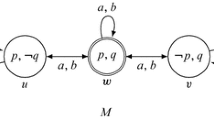Abstract
There are three main approaches to the representationof temporal information in AI literature: theso-called method of temporal arguments thatsimply extends functions and predicates of first-orderlanguage to include time as the additional argument;modal temporal logics which are extensions ofthe propositional or predicate calculus with modaltemporal operators; and reified temporal logicswhich reify standard propositions of some initiallanguage (e.g., the classical first-order or modallogic) as objects denoting propositional terms. Theobjective of this paper is to provide an overview onthe temporal reified approach by looking closely atsome representative existing systems featuring reifiedpropositions, including those of Allen, McDermott,Shoham, Reichgelt, Galton, and Ma and Knight. We shalldemonstrate that, although reified logics might bemore complicated in expressing assertions about somegiven objects with respect to different times, theyaccord a special status to time and therefore haveseveral distinct advantages in talking about someimportant issues which would be difficult (if notimpossible) to express in other approaches.
Similar content being viewed by others
References
Allen, J. F. (1983). Maintaining Knowledge about Temporal Intervals. Communications of the ACM 26(11): 832–843.
Allen, J. F. (1984). Towards a General Theory of Action and Time. Artificial Intelligence 23: 123–154.
Allen, J. F. & Ferguson, G. (1994). Actions and Events in Interval Temporal Logic. the Journal of Logic and Computation 4(5): 531–579.
Allen, J. & Hayes, P. (1985). A Common-sense Theory of Time. Proceedings of IJCAI'95, 528–531.
Allen, J. & Hayes, P. (1989). Moments and Points in an Interval-based Temporal-based Logic. Computational Intelligence (Canada) 5: 225–238.
Bacchus, F., Tenenberg J. & Koomen, J. A. (1991). A Non-reified Temporal Logic. Artificial Intelligence 52: 87–108.
Benthem, V. (1984). The Logic of Time. Dordrecht: Kluwer Academic.
Davidson, D. (1967). The Logical form of Action Sentences. In Nicholas Rescher (ed.) The Logic of Decision and Action. University of Pittsburgh Press.
Davidson, D. (1969). The Individuation of Events. In Nicholas Rescher (ed.) Essays in Honor of Carl G. Hempel. Dordrecht: D. Reidel.
Gabbay, D. (1989). The Declarative Past and Executable Future. Temporal Logic in Specification: Altrincham Workshop 1987 (Lecture Notes in Computer Science) 398: 409–448.
Galton, A. P. (1990). A Critical Examination of Allen's Theory of Action and Time. Artificial Intelligence 42: 159–188.
Galton, A. P. (1991). Reified Temporal Theories and How to Unreify Them. Proceedings of IJCAI'91, 1177–1182.
Galton, A. P. (1996). An Investigation of Non-intermingling Principles in Temporal Logic. Journal of Logic and Computation 6(2): 267–290.
Gelfond, M., Lifschitz, V. & Rabinov, A. (1991). What are the Limitations of the Situation Calculus? In Working Notes of AAAI Spring Symposium Series: Logical Formalization of Commonsense Reasoning, 59–69.
Halpern, J. Y. & Shoham, Y. (1991). A Propositional Model Logic of Time Intervals. Journal of the Association for Computing Machinery 38(4): 935–962.
Hamblin, C. L. (1971). Instants and Intervals. Studium Generale 24: 127–134.
Haugh, B. A. (1987). Non-Standard Semantics for the Method of Temporal Arguments. Proceedings of 10th IJCAI 1: 449–455.
Kripke, S. (1963). Semantical Considerations on Modal Logic. Acta Philosophic, Fennica 16: 83–94.
Lifschitz, V. (1987). A Theory of Action. Proceedings of 10th IJCAI, 966–972.
Long, D. (1989). A Review of Temporal Logics. The Knowledge Engineering Review 4(2): 141–162.
Ma, J. & Knight, B. (1994). A General Temporal Theory. The Computer Journal 37(2): 114–123.
Ma, J., Knight, B. & Petridis, M. (1994). A Revised Theory of Action and Time based on Intervals and Point. The Computer Journal 37(10): 847–857.
Ma, J. & Knight, B. (1996). A Reified Temporal Logic. The Computer Journal 39(9): 800–807.
McArthur, R. (1976). Tense Logic. Dordrecht: Reidel.
McCarthy, J. & Hayes, P. J. (1969). Some Philosophical Problems from the Standpoint of Artificial Intelligence. In Meltzer, B. & Michie, D. (eds.) Machine Intelligence 4: 463–502.
McDermott, D. V. (1982). A Temporal Logic for Reasoning about Processes and Plans. Cognitive Science 6: 101–155.
Prior, A. (1955). Diodoram Modalities. Philosophical Quarterly 5: 205–213.
Pnueli, A. (1977). The Temporal Logic of Programs. Proceedings of 8th. IEEE Symp. On Foundations of Computer Science, 46–67.
Reichgelt, H. (1989). A Comparison of First-order and Modal Logics of Time. In Jackson, P. and van Harmelen, H. R. F. (eds.) Logic-based Knowledge Representation, 143–176.
Rescher, J. & Urquhart, A. (1971). Temporal Logics. Springer Verlag.
Russell, B. (1903). Principles of Mathematics. London: George & Unwin.
Shoham, Y. (1987). Temporal Logics in AI: Semantical and Ontological Considerations. Artificial Intelligence 33: 89–104.
Shoham, Y. (1988). Reasoning about Change: Time and Causation from the Standpoint of Artificial Intelligence. MIT Press.
Terenziani, P. & Torasso, P (1995). Time, Action-Types, and Causation: an Integrated Analysis. Computational Intelligence 11(3): 529–552.
Vila, L. (1994). A Survey on Temporal Reasoning in Artificial Intelligence. AI Commun. 7: 4–28.
Vilain,M. B. (1982). A System for Reasoning about Time. Proceedings of AAAI-82, 197–201.
Author information
Authors and Affiliations
Rights and permissions
About this article
Cite this article
Ma, J., Knight, B. Reified Temporal Logics: An Overview. Artificial Intelligence Review 15, 189–217 (2001). https://doi.org/10.1023/A:1011018426725
Issue Date:
DOI: https://doi.org/10.1023/A:1011018426725




